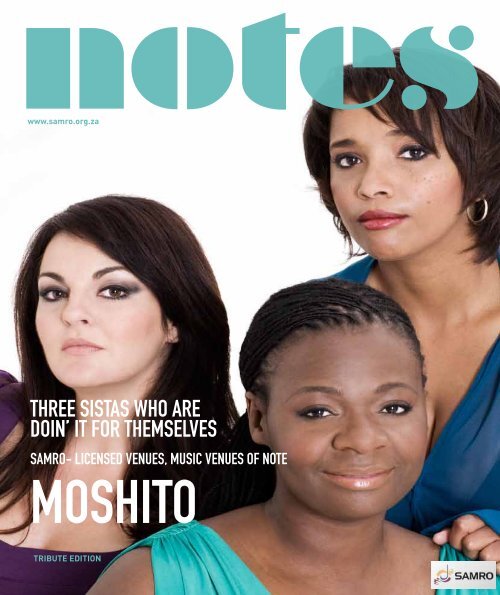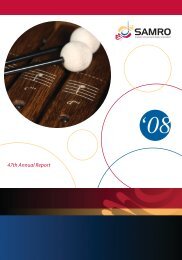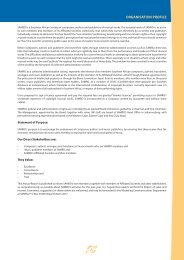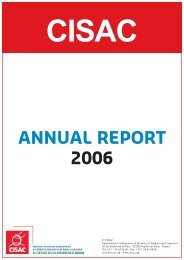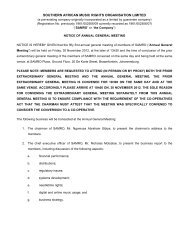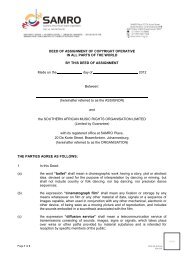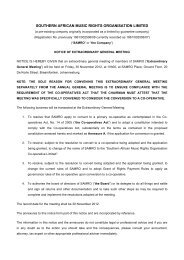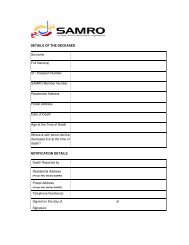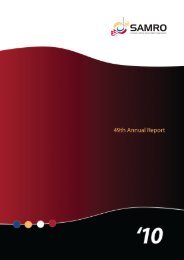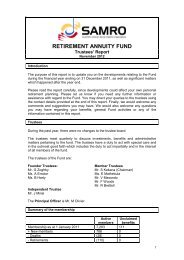Download eZine now? - samro
Download eZine now? - samro
Download eZine now? - samro
Create successful ePaper yourself
Turn your PDF publications into a flip-book with our unique Google optimized e-Paper software.
noteswww.<strong>samro</strong>.org.zaTHREE SISTAS WHO AREDOIN’ IT FOR THEMSELVESSAMRO- LICENSED VENUES, MUSIC VENUES OF NOTEMOSHITOTRIBUTE EDITION
notes9EDITIONnotesCONTENTSMESSAGEFROM THE CEOUptam is maio quis volori secerferum sa consenis dolor siveressequi santis ese nis sene ad etus earchil ipieniet ipsam quemaximi, odiciature eicae. Nam et modit qui nos nim reperoevent aborerfero torum facid etur? Eque veni berrovita voluptibussimint miliqui autem architiis ipicien imoluptat.Rentemp osanderitis a nonsendentem ne prendebit molo bersped maximpo restium rem et odis aute net doluptaadia volendi tatur, occus.Daee cor sum, secatecatem. Ita dictatis sam, quo etur aspe eligeniae. Nem re entem velendisciis perio. Et et plignamunt aut volenimolor sit, simusae coneceat et, inctur, con poreic te eatendit im volor maio. Ut qui aut endam disalitam es voluptate plab ilitatu sdaerspe occum velibus num ea verum inis sapitis eniae. Ut faciati oreprep elicabo.Eque nost, cus quia arit, volecab orerchi ligentor simenderi qui nonsecaes volorro etur reic temquos doluptathitiaepe sam, seculparum quae. Est maximol uptatur, iust ut et pliquo te quos nimiliqui beatempor min porehendusanda eperum non corporporrum is es suntur maxim eum cupti consendic tentur?OneNick MotsatseCONTENTS1. SAMRO & VENUESSAMRO- LICENSED VENUES, MUSICVENUES OF NOTE3.CULTURE5.MAIN FEATURE STORY TO BE SEND6.MUSIC INDUSTRY ROUND UP THE SECRET TOSUREFIRE SUCCESS7.IP FEATURE THE TRADITIONAL KNOWLEDGE BILL LegalAPPLYING TO PROTECT MEMBERS RIGHTS8.SAMROLLegacy Feature – Siva Devar9.NEWS Feature- MAKE MUSIC YOUR BUSINESS AT MOSHITOBOOSTING TOMORROWS MUSICIANS TODAY10.SENA CATCHING UP WITH PAST WINNERS9Samro Editorial TeamSAMRO Notes- Spring IssueEditorial TeamVanessa PerumalProject Management Rami Nhlapo Writer Romy TitusWriterNadia NeophytouWriter Zama NyuswaWriter Christina KennedySubs/WriterYavi Madurai Editor Contributors Roshni Moonsammy Music promoter’s perspective for internationalbreakthrough NomaHlubi Simamane Hair and Make-up- Lesley Whitby using MacFashion Stylist’s- Kim Berell and Zanalee Van der WesterhuizenClothing- Purple Dress from Jo Borkett Teal Dress from Kluk CGDT Green Dress from Kluk CGDT
MAINFEATUREnotesMAIN FEATURE 00THREE SISTASWHO AREDOIN’ IT FORTHEMSELVESTo celebrate Women’s Month in August and HeritageMonth in September, SAMRO Notes is focusing on three exceptionalwomen who have taken the reins and made their mark on theSouth African music industry.Judith Sephuma, Auriol Hays and Tasha Baxter are the three dynamic “sistas” that weare celebrating in this issue.Being a woman can be challenging in a male-dominated music world, especially when it comes to balancing careerand family, bringing forth your individual artistic vision and being in control of your music as abusiness and revenue stream.From Cape Town to Limpopo, these three phenomenal women have been doing it for themselves, beating theodds. Seemingly from very different backgrounds, what each of these amazing women has in common is thetenacity to navigate their own path in the cut-throat music industry with poise and sophistication.So what does it take for woman to make it in the music industry? We touched base with the three ladies to findout what makes them tick and to get some key insights into their success and how young, up-and-coming sistas canget a piece of the pie…
notesMAIN FEATURE 00JUDITH SEPHUMA: ‘YOUR MUSIC IS ALEGACY IN THE MAKING’Afro-jazz artist Judith Sephuma has been makingbeautiful music since her debut in the ’90s withhit songs such as A Cry, A Smile, A Dance. Fromher humble beginnings in Limpopo to her currentstatus as one of the most prolific songstresses ofher generation, her understanding of music asbusiness ensures that she stays at the top of hergame.JS Who are your musical influences?SN I am inspired by a lot of artist that have come and gone through time. But mostlyit is life, nature and experiences that I go through daily: being able to overcome certainthings in one’s life and still remaining on top of every situation.JS What lessons have you learnt from those who inspire you, to getto where you are today?SN Well, I am still learning, but what I can tell you is that we are not meant to runwhen the going gets tough. We need to learn how to have staying power through itall. I also k<strong>now</strong> that in this industry, competition doesn’t really work for me. I havelearned that we are all unique and are all very special. That’s how God created us.We have different impacts on people because of our uniqueness.JS What does it take to successfully enter the music market?So I used that to my advantage and started focusing on the positive things in me.JS Give us some tips on how you ensure that your brand and yourwork is administered properly.SN I run my career as a business. Judith Sephuma is managed by Lalomba Music,which is also my recording label. Growth comes when one stops being afraid ofthe unk<strong>now</strong>n. I realised that I put myself under pressure when I don’t k<strong>now</strong> what’shappening, so I decided to employ staff that will manage my affairs closely accordingto my rules, but also people that I could love and have them love what I do and me.Another point is to always look good on stage and to always remember that youare as good as your last performance. So do your best at all times and always try toperfect your craft.SN A good and clear communication with clients is very important; arguments resultin you being out of work or disrespected. So I will always double-check on thingsbefore I misunderstand anything and, most importantly, document stuff.If your brand is to get to another level, there needs to be a differentiation betweenemployer, employee and friends.SN Always remember to focus on what your goal is. This industry does not have rulesthat suite individuals, they suite whoever works hard. So focus on you and your giftand your business. Make every moment of your career count.JS Why is it important to make use of the services that anorganisation such as SAMRO has to offer?SN My music is a very personal thing and I speak on behalf of all artists on this. It’simportant that I am protected so that I can keep working hard and be inspired toalways produce. It would be a mess if we were just relying on ourselves to keep trackof our legacy. Your music is a legacy in the making. Every song, every note has tobe very personal.AURIOL HAYS: ‘WHEN MUSIC STOPS BEING FUN,YOU ARE IN TROUBLE’Auriol Hays is a young, up-and-coming singerand songwriter with an old soul who hails fromthe Western Cape. Her critically acclaimed debutalbum, Behind Closed Doors, with its appealingjazzy-pop sensibility, has made her one of themost sought-after musicians on the scene.AH Who are your musical influences?SN I am inspired by the usual suspects – Ella Fitzgerald, Nina Simone, Sarah Vaughan,Anita O’Day, John Lee Hooker and any kick-ass blues song. The there’s Radioheadand all the bad pop songs my mother listened to when I was a kid.AH What lessons have you learnt from those who inspire you, to getto where you are today?SN In general it’s the bitter, angry musicians that inspire me – people who havefought tooth and nail to be where they are. I think of artists such as Nina Simoneespecially, who was so bitter. I watch her live performances and two things strike meimmediately: that she is brilliant and that I should try not to become as bitter or sadwhen things don’t go my way.I think of Billie [Holiday] – who must have been one crazy hellcat – who found ameasure of peace when she sang. And that’s the beauty of music. You can sing andforget all your insecurities. In fact when I am really low, I close the doors and singall the jazz and blues songs I k<strong>now</strong>. My poor, poor neighbours…AH Z What does it take to successfully enter the music market?AHPlease share with us some of your trials and successes thathave shaped your musical path.SN The worse thing I have had to put up with is people. People who made me feel asthough everything about me is wrong or not enough. It can be very disheartening,but I try not to let it get me down. And when it does, I do the only thing I can do:I kill them off in the songs I write.The best musical experience I had was singing in a small bar in Buccleuch with KeiraWitherkay and her acoustic band. Something very special and intimate happenswhen you sing and happen to be heartbroken and oh so very sad. The way that Iemoted those jazz songs was pure magic. I should be sad and depressed more… lol!AH Give us some tips on how you ensure that your brand and yourwork is administered properly.SN Well, the fact that you should join SAMRO goes without question. It is usuallythe first thing I ask musicians.Then, having a clear idea of what you would like to achieve always helps. It gives youa clear goal and a reason to wake up in the morning.You should always be ready to listen to others and take advice. Now, you might notalways agree with them because, let’s face it, some people talk a lot of crap. Ratherask yourself if the advice you are given can be adapted to your needs.When music stops being fun, you are in trouble.AH Why is it important to make use of the services that anorganisation such as SAMRO has to offer?SN The fact is that most.musicians have no business sense. They get up, write music,and perform it and dream big. Very often, the business of music is left to people whocannot always be trusted. An organisation like SAMRO gives musicians the resourcesso they can make proper business decisions. It always helps being informed of yourrights and wrongs!SN I believe that there is no formula for making it in this industry but only hard work.So you just do your best and hope for the best. Most of all, no gambling is allowedwith your career. That’s when we will fail. I think one must just believe that whatthey are doing will work, no matter what. Love what you do more than anything.JS Please share with us some of your trials and successes thathave shaped your musical path.SN SAMRO helps us to keep creating the beautiful music – especially when you getroyalties, but it is more than just about getting royalties. You are protected so thatno one can abuse your legacy. Everyone needs to be a member of SAMRO if you area creative person. If you are an artist, it’s also up to you to educate yourself about allof these things and to do research. Every day should be a learning curve if you area creative person.SN That depends on how you define success. That definition will determine howmuch work you have to do. There were nights when I felt so lost and unsure of myselfor my ability to sing. So I only offered one prayer to my “people upstairs”. I toldthem that all I wanted was to sing… Everything else came from that single desire.So getting very clear on what success would look and feel like is very important.SN You k<strong>now</strong>, trials are there every day. I live life for today and tomorrow is all I have;yesterday came and went. So what I went through yesterday brought me to whereI am today. The one thing was not being accepted because I wasn’t light-skinnedenough to fit in with other kids when I was growing up. But that made me realisethat I am a beautiful person and there had to be something really special about me.CAPTIONS CAPTIONS CAPTIONS CAPTIONS CAPTIONS CAPTIONSCAPTIONS CAPTIONS CAPTIONS CAPTIONS CAPTIONCAPTIONS CAPTIONS CAPTIONS CAPTIONS C
notesMAIN FEATURE 05Tasha Baxter: ‘There is nothing stopping youbut yourself’Feisty SAMA award-winning singer, songwriter,producer, musician and sound engineer TashaBaxter, who had a smash hit debut album withColour of Me, understands the ups and downs ofthis business. But her passion for music and hernever-say-die attitude have been a driving forcethat pushes her to keep reaching new heights.TB Who are your musical influences?SN I can honestly say it is a conglomeration of music and memories that influencemy work. It is hard not to be influenced, even if it is subliminally, so it is hard topinpoint. I can say, however, that I love everything from jazz and blues to metal,drum ’n bass, most electronic music and most in between. I can’t stand R&B, though!SN As a teenager, No Doubt and Gwen Stefani were a big influence on me; so wereAretha Franklin, Etta James and Miles Davis. I love being versatile and choppingand changing on a regular basis. If I am not growing, evolving and learning, I ambored to death.TB What lessons have you learnt from those who inspire you, to getto where you are today?SN The lessons I have learnt have come from my own personal life, as it is all I k<strong>now</strong>and is real to me. I have learned that sometimes you need to unlearn and that is atask on its own; your ways can hinder you if you are not keeping a close check onyourself at all times.Having my two kids by the age of 21, my life was quickly put into perspective andI realised my values at a young age. I learnt to be tenacious and resilient. Timemanagement is huge, and something I have to work at every day! Having a healthymind and body helps, which is also something I am constantly working on.Where I am today will change tomorrow and the next day, and I can safely say I amnot where I will be in a few years’ time, and if I get comfortable and think I have “madeit” then I am very mistaken. You need support from family and friends, you need tokeep financially stable and you need to persevere with passion and determination,k<strong>now</strong>ing that you will have friends and enemies along the wayTB What does it take to successfully enter the music market?SN You need to have talent, balls of steel and thick skin! It’s hard out there and thereare many waiting in the wings to “one-up” you every second of the day. So don’t sleepon your stuff! You are never too young, too old, too poor, too fat, too thin, too short.If you have that raw talent, there is nothing stopping you but yourself. Set your owngoals, polish your craft, learn another and be humble!TB Please share with us some of your trials and successes thathave shaped your musical path.SN The last two years have been the most hectic for me. All that I knew and wascomfortable with changed. This then meant that I had to change: my thinking, myways, my relationships – everything.My boyfriend of five years moved to Sydney, I was struggling financially, trying tosupport myself and the kids, my car was stolen with my laptop that had all my newmaterial on it, my brand-new guitar was in the car too (my fault completely), I haddebt coming out my ears, and music was becoming my downfall because I was sodesperate to make it work, I dropped the ball with everything else – my kids, myrelationship, my family and myself.When days are dark, friends are few – and in this industry, it’s as fickle as a wolf insheep’s clothing. I have been focusing on what life really means to me, my childrenand me.I write music for commercials at Freq’ncy Music, which I am loving: learning toproduce my own stuff and make pictures sound pretty has been SOOO rewarding.I’ve been finishing the second album, which is by far my best work as it is as true andraw as it comes. I’ve also not been trying to write songs just to get airplay on the majorstations – which, by the way, have <strong>now</strong> changed their tune completely by playing thelikes of Die Antwoord and Jack Parow. Things are changing and it’s great. Finally!TB Give us some tips on how you ensure that your brand and yourwork is administered properly.SN Admin is my absolute worst! And not being organised and admin-savvy has costme bucketloads. Your brand is everything; I, for one, can tell you that I have seenthe pros and cons to this.Have a logo, have good PR – PR is king – have a good publisher (I use Jay Savageat Sony ATV), make sure you send in all your songs, your gigs and performances,keep in touch with friends and liaise with SAMRO on a regular basis. If you can,start your own label, but make sure you have good legal representation and someoneto manage the admin.TB Why is it important to make use of the services that anorganisation such as SAMRO has to offer?SN SAMRO has really been amazing to me over the years; I have been a member forages and have received some great wads of cash from airplay on my music.Being in the advertising industry too, they are a huge part of the extra earnings I makewhen I write music and do vocals for TV and radio commercials. They have alwayshad my back: I have made no money from sales of my album at all, which is part ofthe reason why [my former record label] dropped me, but the amount of songs I wroteand had played on stations nationwide and internationally has made up for it hugely.SAMRO is about protecting the rights of artists. I can always count on them to collectthe royalties, send me my statements, newsletters and invites to events that help usgrow as independent artists. So at this stage, I am releasing independently, and havinga great relationship with SAMRO over the years proves that I can release digitallyall over the world, not give half the cash away to a label, and still make good cashfrom airplay and licence deals, international collaborations and performances.notesMAIN FEATURE 05NOTEDUBUTANTE’SPOLISHED SOUNDLike a precious gem, Ternielle Nelson’s debut CD titled ‘Unearthed’ can be compared to a rarefind.Born in Durban, this Joburg resident has broken into the music industry almost silently, yetmany have started sitting up and taking notice of the young singer-songwriter, who dedicatesher musical talent to her late mother and young daughter.She strums to her own tune, thoughts and music, baring the bittersweet truth of her experiencesthough her work, a genre-defying sound laced with elements of jazz and neo-soul.Discovered by jazz stalwart Selaelo Selota, Nelson’s talents were put to the test when he approachedher to step into his recording studio and perfect her art – and she has not looked backsince.She chose the title of her 10-track debut album based on her journey in life: the passing of herparents, the birth of her baby and her thoughts on being a young African woman.‘Unearthed’ features a wide range of eclectic influences, with a hint of hot melodies and spicylyrics. This offering definitely leaves one wishing for more…
CREDITS OF PICSANDCREDITS OF PICCREDITS OF PICCREDITS OF PICCREDITS OF PICCREDITS OF PICMUSICINDUSTRYROUND UP >>PSSST… NEED SOME HOT TIPS? SAMUSIC EXPERTS GIVE SAMRO NOTES THELOWDOWN ON HOW TO MAKE IT IN THECUT-THROAT MUSIC BIZCAPTIONS CAPTIONS CAPTIONS CAPTIONS CAPTIONS CAPTIONSCAPTIONS CAPTIONS CAPTIONS CAPTIONS CAPTIONCAPTIONS CAPTIONS CAPTIONS CAPTIONS CnotesMUSIC INDUSTRY ROUNDUP 00THE SECRET TOSUREFIRE MUSIC SUCCESSArtistic integrity. Media and marketing anddigital savvy. Great songwriting. A willingness towork – hard! These are just some of the attributesof a successful artist, according to a survey of someof the top managers, booking agents and promotersin South Africa.notesmusic industry roundupCREDITS OF PICSANDCREDITS OF PICCREDITS OF PICCREDITS OF PICCREDITS OF PICCREDITS OF PIC
notesMUSIC INDUSTRY ROUNDUP 00notesMUSIC INDUSTRY ROUNDUP 00And they are notwrong: take a look atthose artists who arecurrently impactingon the national andinternational musicindustry and you can seeit takes more than luckand talent tomake an impact.Bands like The Parlotones, Blk Jksand Tidal Waves (all featured in the May 2010issue of SAMRO Notes) are not sitting backand waiting for things to happen: all three areactively pursuing the gaps that have opened forthem internationally with commitment, visionand lots of blood, sweat and tears.It’s the same for several other South Africanartists who’re creating a stir internationally.Locnville <strong>now</strong> have a deal with Jive in the US(Epic in the UK) and are playing in places likeSweden – keeping their fans up to date withregular Twitter updates and a website thatallows for interaction.Rap-rave outfit Die Antwoord is currentlyundertaking the most extensive live tour everby a South African act, playing to sold-outaudiences in Europe, the US and Japan – theircross-country gallivanting putting no stopto Ninja and Yo-landi’s extensive Facebookcontact with their fans.Artists like Lira and Prime Circle are alsohard at work, preparing to take their successfulSouth African careers to new markets in 2011.But the fact is that even in a relatively smallmarket like South Africa (by global standards),it takes something other than just existing tobe noticed. As one of the cover stars of thisissue of SAMRO Notes, Auriol Hays, puts it: “Iwish I could say that all it takes to be successfulis a great voice and hard work, but that wouldnot be entirely honest! There are thousandsof amazingly talented singers who are stillsinging in their bathrooms or dodgy clubs.Having a plan and a clear idea about what youwant from your career is vital.PLANNING AND SHEER HARDWORKFor Roshnie Moonsammy, who runs the Urban VoicesFestival, the plan should start with several essentialingredients: “Hard work, quality, good management,k<strong>now</strong>ing your music rights, good social and culturalk<strong>now</strong>ledge of life and the world, enjoying people,coming across well in the media – and that’s just forstarters!“You should also be able to work well with your fellowmusicians – always trying new things, collaborating,working with different producers, and having a sense ofwhat is going on internationally and locally in music.”It may sound like a tall order but, says Billboard’scorrespondent for South Africa, Diane Coetzer, it’sbeen proved doable and it shows in the artists whotake their careers seriously.“Some artists do buy into the culture of expectancy, butthis only works for a short period of time,” commentsCoetzer. “Artists who are successful are thinkingabout all aspects of their career, even if they are notundertaking each part themselves.“Simple things, like turning up for an interview witha member of the press on time and having thoughtthrough what you want to say makes a lastingimpression. Believe me, if an artist does break throughinternationally, the press isn’t going to indulge themif they insist on treating the journalist’s time as lessvaluable than theirs for very long – no matter howtalented they may be.”Morgan Ross, who handles PR and events atG-Management, reiterates the hard work aspect ofmaking a successful jump from your town to a big city,from Cape Town to Joburg, and from South Africa tobeyond our borders. “An artist who is lazy won’t getanywhere. Too often, I think artists sit back and letmanagers or record companies do all the work, but thatmeans nothing if the artist isn’t hard-working.”The need for artists to take an active role in their careeris something Moonsammy also believes strongly in,saying: “I have been working internationally since1985 and if I have learnt one thing, it’s that you mustbe driven. Don’t put your destiny in your record labeland manager but work together to achieve success.”WORK THE CROWDMantwa Odutayo, General Manager at T-Musicman(one of South Africa’s most successful promoters), saysthat one of the keys to getting noticed in the crush ofartists out there is k<strong>now</strong>ing your audience.“Artists must be true to themselves and to the marketsthey want to appeal to,” says Odutayo. “The mostimportant people in this respect are the audiences. Ifan act appeals to an audience, then we (T-Musicman)will take note.”For this veteran promoter, a defining feature of allsuccessful artists she has worked with on projects likeJoy of Jazz is artistic integrity. “Artists that have artisticintegrity and present a performance that has beenclearly defined to appeal to their audience is what Isee as a common thread in the international and localartists we work with who have managed to build asuccessful career.”KNOW YOUR RIGHTS!Moonsammy believes strongly in the self-empowermentelement of a successful career. “I have just done theSAMRO music rights course,” she reveals, referringto SAMRO’s Business Principles of Songwritingand Music Publishing part-time course being run inpartnership with Wits University.“So few people in the industry understand the valueof this kind of thing. You need to get to grips aboutcomposing, your Needletime rights, publishing andmore, so you don’t get ripped off and end up havingpeople donate for your burial!”A forum like the annual Moshito Music Conferenceand Exhibition is a South African-specific space toenhance your k<strong>now</strong>ledge and grapple with currenthot topics (like the digital domain) – but anyone withaccess to the internet (even at a public café) can researchand empower themselves with the k<strong>now</strong>ledge neededto have a basic and working k<strong>now</strong>ledge of music rightsand more.HONE YOUR SONGWRITINGCRAFTHays is adamant that artists should not sit back and taketheir gifts for granted. The singer and songwriter – whoin 2010 will notch up performances at the MontreuxJazz Festival, the Joburg Arts Alive International Festivaland Joy of Jazz – says thinking “practically about thesongs you sing and write” is key.“One good song, even a pop one, could give you theboost you need to get noticed. So, great songwritingis essential.”EMBRACE CYBERSPACEDo the digital dance – but do it with quality, asMoonsammy suggests. When Die Antwoord shot toglobal fame on the back of the viral video Enter theNinja (<strong>now</strong> edging towards six million views since itwas loaded six months ago), the video itself was hailedas exceptional and the music acclaimed as deliveringsomething fresh to the global music community.The idea of integrity and authenticity also comes intoplay here. As Hays puts it, “Tapping into social mediareally does help. Facebook, Twitter and even MySpacemakes you more accessible to fans. This is especiallyimportant as music is so easy to obtain these days. Ifthe fans k<strong>now</strong> that you take an interest and answer theirquestions when you do get them, they will be morewilling to come to your shows and buy your CDs.”Adds Moonsammy, “Artists need to be aware of themarketing and media aspects of the music industry andhave the right attitude and zeal.”It’s not just about being a star, she says: “It’s aboutdeveloping your brain with a strong consciousness ofthe cultural and social issues. Look at how well Lira isdoing! She is intellectually developed and conscious,and great for local and international media.”GET YOUR MUSIC ON THE RADIOFinally, don’t ever underestimate the power of thebasic tools of the trade – from strong and well-craftedsongwriting to stellar live shows to the role of radio.“Radio, radio, radio,” says G-Management’s Ross,when asked what she thinks is important in sustainingand growing a successful artist – both at home andabroad.“Radio play is often the most powerful tool for artiststo get noticed. It is their most important form ofadvertising. We have also seen a huge shift fromtraditional to digital marketing, and those artists whoare active online, and are gaining a fanbase digitally, areoften a step ahead.”SO WHAT’S THE RECIPE FORSUCCESS?So there you have it. The days of sitting back andrelying on your creative talent to do the work for youare gone: if you want to make a surefire success of yourcareer internationally – or indeed, here at home – getto work. Make plans. Take an interest and learn aboutthe environment in which you operate. Get active inthe digital space. Work your songwriting craft. Pouryour heart and soul into the live gigs you do, no matterhow big or small.And take heart: there is a growing global interest inall forms of homegrown music, which means SouthAfrica’s time is coming!CAPTIONS CAPTIONS CAPTIONS CAPTIONS CAP-TIONS CAPTIONSCAPTIONS CAPTIONS CAPTIONS CAPTIONSCAPTIONCAPTIONS CAPTIONS CAPTIONS CAP-TIONS CPICTURE CREDIT PICTURE CREDITI PICTURE CREDITI PICTURE CREDITI PICTURE CREDITI PICTURE CREDITI
notesIP FEATURE 00 notesIP FEATURE 00THE TRADITIONAL KNOWLEDGE BILLAND YOUR ROYALTIESThe SAMRO Group, being SAMRO and its subsidiary companyDALRO, is in the business of ensuring that you, the copyright owner,are compensated for the use of your work.So, whether your song is performed at apublic concert, or played on the radio orin a nightclub, it is SAMRO’s responsibilityto collect the royalties due to you and toensure that these are paid to you.Similarly, as an author, DALRO would collect royaltiesarising from the photocopying of your book for use inuniversity course-packs and pay these over to you. Ittherefore follows that SAMRO will always do what itcan to protect not only your royalty, but your right toearn that royalty.The SAMRO Group’s interest in the IntellectualProperty Laws Amendment Bill (popularly k<strong>now</strong>n asthe Traditional K<strong>now</strong>ledge Bill) is one example of itscommitment to protecting your right to earn a royalty.The Traditional K<strong>now</strong>ledge Bill is a law proposed by theDepartment of Trade and Industry (DTI), which triesto use intellectual property laws to protect traditionalk<strong>now</strong>ledge.Despite the concerns that SAMRO has with this Bill,the organisation is fully behind the development of aframework to protect traditional k<strong>now</strong>ledge.“SAMRO is very aware of the fact that elements of thetraditional k<strong>now</strong>ledge of South African communitieshave been expropriated and exploited for centurieswithout due ack<strong>now</strong>ledgement or compensation beinggiven to the communities,” says Nothando MigogoHlatshwayo, General Manager: Corporate and Legalat DALRO.“It is for this reason that implementing an appropriateway of protecting this k<strong>now</strong>ledge from unauthoriseduse and, where relevant, compensating its creators andowners, is important and overdue.”However, SAMRO is of the view that such a legalframework should be developed using a system oflaw specifically developed for traditional k<strong>now</strong>ledge,arguing that the Copyright Act should not be amendedto accommodate traditional k<strong>now</strong>ledge.“What we propose is that a sui generis law (i.e. aunique law of its own kind) should be speciallydeveloped to protect traditional k<strong>now</strong>ledge and alsoassist communities in ensuring that they have adequatecontrol over the use and commercialisation of theirk<strong>now</strong>ledge,” explains Hlatshwayo.She says that the Bill may sow confusion anduncertainty among artists. Ownership within thecurrent intellectual property framework is a standardand predictable concept where the owner of any typeof intellectual property is either the creator or any otherperson that the creator has assigned the ownership to.According to the Bill, a performer (not necessarily thecreator) is the owner of the right under the Performers’Protection Act, a government trust fund (the NationalTrust Fund for Traditional Intellectual Property)would be the owner under the Copyright Act, and thetraditional community would be the owner under theTrade Marks Act and the Designs Act.In addition to potential legal problems, authors andcomposers could lose the copyright in any futurework they create that is based on a traditional song orstory. Furthermore, the current copyright frameworkthat protects creators’ right to royalties would not beguaranteed.“It is for these reasons that we strongly feel that theBill is doing more harm than good when trying toprotect community-based traditional rights using anindividual-based intellectual property system,” she says.SAMRO’s support for a stand-alone law for traditionalk<strong>now</strong>ledge was echoed by representatives of the labourand business sectors in the July 2010 Parliamentaryhearings of the Portfolio Committee on Trade andIndustry. It was also supported by the Department ofScience and Technology, as well as a number of MPspresent in Parliament.Following the hearings, the MPs asked the DTI toproduce a report explaining why the TraditionalK<strong>now</strong>ledge Bill is in conflict with the recommendationsmade by labour and business, the Africa Group at theWorld Intellectual Property Organisation (WIPO),as well as numerous academics working in the area ofintellectual property and traditional k<strong>now</strong>ledge.While awaiting this report, SAMRO and DALRO shallcontinue to attempt to engage with the DTI on thismatter while continuing to protect your rights andinterests.For more information on the Intellectual PropertyLaws Amendment Bill, log on to www.<strong>samro</strong>.org.za.CAPTIONS CAPTIONS CAPTIONS CAP-TIONS CAPTIONS CAPTIONSCAPTIONS CAPTIONS CAPTIONS CAP-TIONS CAPTIONCAPTIONS CAPTIONSAPPLYING THE LAW TOPROTECT MEMBERS’RIGHTSThe Southern African MusicRights Organisation hasgrown into arguably one ofthe most respected copyrightadministration bodies in Africa,thanks in part to thecareful attention that is paid tolegal matters.Sibusiso Mthenjane, Manager of SAMRO’s LegalServices Department within the CorporateAffairs Division, explains the various functionsof his department as it relates to the rest of theorganisation.“SAMRO has different rights that we administer,”he says. “These include Performing rights,Mechanical rights and Needletime rights. Asan organisation we need to see to it that allthese rights are administered effectively andour department ensures that people who needto sign contracts (or licence agreements) inrelation to all these rights, do so.”The Legal Services Department has anobligation to advise the company on generallegal principles that might affect the company,not only on copyright matters.“We have an obligation to see to it that the usersof music have got proper licences,” he said. “Interms of the Copyright Act, the owners of musichave the exclusive right to issue licences for theusage of their music.“In this way, we assist the licensing departmentwith formulating licence agreements andmonitoring the process of signing of thoselicence agreements,” he added.The next process is to ensure that music userswith licences pay for their music usage, and tocollect monies if they don’t pay.“Here we assist our control department, which istasked with collecting from those licensees whohave licences with us,” he said. “If they are notpaying, they are handed over to us and we dealwith that.“If they are still refusing to pay, we hand them overto our attorneys. We have an obligation to ensurethat attorneys who have received instructionfrom us perform as expected according to thestandards set by SAMRO.”When it comes to instituting action againstpeople who use music without licences,SAMRO statistics reveal that the most common“infringers” are shebeens and community radiostations. This means that music being playedin these establishments is not receiving anyrecognition for being played, and therefore thereis no reward for the musicians.Mthenjane said the department also assists theWriter Services Department with distribution ofdeath benefits linked to the SAMRO retirementannuity fund (SRAF). “We also help WriterServices with identifying successor members.When you join SAMRO you become the mainmember. If you should die, we have to appointan individual member who will continue tobenefit from the royalties that you (the member)accumulate,” he said.Each member with active works is registeredwith administrator of the SRAF, which isAlexander Forbes. Beneficiaries are identifiedto receive benefits that accrue after one ofSAMRO’s members has died, and the moneythat has been accumulating is distributed to therightful beneficiaries.He said: “We subscribe to the fund on behalf ofthe members and the only condition is that youhave to be a member of SAMRO and your worksmust be active then we start contributing.”According to the Copyright Act, a memberbenefits from royalties as long as he/she is alive,but after death there is a 50-year period duringwhich his/her heirs or beneficiaries will benefit.Once this period expires, the works go into the publicdomain and can be used freely. Here, the function thatthe Legal Services Department is tasked with is to electsuccessor members.“Lobbying is also part of our task,” Mthenjane said.“We look at existing legislation, identify where itcan be improved and submit our findings to internalstructures of the organisation, which are then taskedwith lobbying government.”Contact SAMRO Legal Services at (011) 712-8000.PICTURE CREDIT PICTURE CREDITI PICTURE CREDITI PICTURE CREDITI PICTURE CREDITI PICTURE CREDITI PICTURE CREDITI PICTURE CREDITICAPTIONS CAPTIONS CAPTIONS CAPTIONS CAPTIONSCAPTIONSCAPTIONS CAPTIONS CAPTIONS CAPTIONS
NEWSCAPTIONS CAPTIONS CAPTIONS CAPTIONSCAPTIONS CAPTIONSCAPTIONS CAPTIONS CAPTIONS CAPTIONSCAPTIONCAPTIONS CAPTIONS CAPTIONSCAPTIONS CCREDITS OF PICSANDCREDITS OF PICCREDITS OF PICCREDITS OF PICCREDITS OF PICCREDITS OF PICMAKE MUSIC YOURBUSINESS ATMOSHITO 2010Songwriters are in for a stimulatingand engaging Moshito MusicConferenceand Exhibition this year.Dubbed Moshito 2010, the annual event – <strong>now</strong> in its seventhyear – takes place from 1 to 3 September at Museum Africa inNewtown, Johannesburg and features a conference programmethat’s poised to deliver some strong content to SAMRO’smembers, and others.It’s no surprise that giving songwriters the tools and up-to-dateinformation to significantly advance their career should featureat Moshito 2010: SAMRO is a founding member of South Africa’sleading music industry event.Says Yavi Madurai, General Manager: Strategy and BusinessDevelopment at SAMRO, “SAMRO is a proud supporter ofMoshito – as its founder, we will continue to support the growthinitiatives as well as contributing to making Moshito bigger andbetter every year.”Read on for a full programme of events at Moshito 2010. Anddon’t forget that as a delegate you can visit the Moshito 2010Expo and catch up with us at the SAMRO stand, as well as get afeel for other important goods and services in the South Africanand international music industry.To round off your full Moshito 2010 experience, make sureyou also take advantage of the free workshops and free liveshowcases detailed here – including the opening networkingevent and the closing Africa Unites concert, which places thespotlight well and truly on the real driving force behind Moshito:innovative, mesmerising, original music that deserves thebroadest platform possible!UK PUBLISHING EXPERT HEADSFOR MOSHITONot to be missed on the Moshito 2010 programmeis Stephen Navin – one of the event’s internationalspeakers.Since 2006, Navin has been the CEO of theIndependent Music Publishers Association (IMPA),representing the profession of music publishing in theUK. Prior to that, Navin – from 2002 to 2005 – wasthe exclusive adviser to the Secretary of State at theUK’s Department of Culture, Media and Sport on allmatters relating to music – social, cultural, educational,and economic. He came to that job following severalyears as acting CEO of the V2 Music Group, reportingto Sir Richard Branson, Chairman of the Virgin Group.IMPA was formed to “safeguard and promote theinterests of music publishers and the writers signedto them; represent these interests to government, themusic industry, the media and the public; providepublishers with a forum, a collective voice and awide range of benefits, services and training courses;promote an understanding of the value of music andthe importance of copyright; and provide informationand guidance to members of the public.”Navin will be taking part in the sessions – and is sure toprovide real food for thought for SAMRO’s members.INDIGENOUS KNOWLEDGESYSTEMS BILL UNDERSCRUTINYIn the last issue of SAMRO Notes (May 2010), severalexperts unbundled the Department of Trade andIndustry’s Intellectual Property Amendment Bill (alsok<strong>now</strong>n as the Indigenous K<strong>now</strong>ledge Systems Bill) toamend the intellectual property statutes – includingthe Trademarks Act, Copyright Act, Designs Act andPerformers Protection Act – to make provision for theprotection of “traditional k<strong>now</strong>ledge”.A session during Moshito 2010 will give those involvedin the music industry the chance to debate this Bill inan open forum – and it’s expected to be one of the mostengaging sessions at the event, and of real interest tosongwriters working in traditional music.MEATY INDUSTRYDISCUSSIONS ON THE MENUThere are plenty of discussions that will be of significantbenefit to SAMRO’s members – among them‘Needletime: The SA Industry’s Copyright Dilemma’,which takes place on 2 September and takes an in-depthlook at this challenging issue on the South Africanmusic industry’s playing field.‘Sync or Swim’ on 2 September is yet another Moshito2010 programme session that should not be missed bysongwriters looking for ways to exploit their intellectualproperty across the multiple platforms that are <strong>now</strong>available to them.And for those intent on looking to new markets fora way to sustain their career, the session titled ‘HowCan The SA Music Industry Unlock the Global Market– And Which Markets to Target?’ on 2 September issimilarly one to get to.GETTING DOWN TO THENITTY-GRITTYSAMRO will be among the music industry organisationsgiving a briefing on its benefits, structure and moreon 2 September – making it the perfect place to askquestions and gain more insight into SAMRO’s currentpositioning in the South African music marketplace.There are also presentations that address the nitty-grittyof financial planning (‘Social Security: Making YourMoney Stretch’ on 1 September) and tax compliance.The latter session on tax compliance may not soundas riveting as, say, the 2 September session titled‘Music, Mobile and Gadgets: How Can the MusicIndustry Help Maximise the Potential of the Mobileand <strong>Download</strong> Market?’, but it is essential for anysongwriter or musician who wants to ensure they are
SENAnotesNEWS 00BOOSTING TOMORROW’SMUSICIANS, TODAYSAMRO has been investing in music educationsince 1962, ensuring that the country has aconstant feed of vibrant young music graduateswhose talent has been allowed to unfurl andblossom with the help of to a SAMRO bursaryor grant.Over almost five decades, SAMRO’s Endowment for the National Arts(SENA) has awarded thousands of music education bursaries and scoresof prized overseas scholarships to deserving young composers, singers,keyboard players and instrumentalists.This ongoing financial commitment to music development seeks to ensurethat the country’s rich musical legacy not only endures, but is constantlyrenewed and refreshed with dynamic new ideas.SAMRO’s core business is looking after and rewarding the creative artistsof today for their hard work, but the organisation considers it equallyimportant to nurture the musical satellites of tomorrow, making them feelthat they have a home in the broader Southern African music fraternity.This year’s SAMRO Overseas Scholarships Competition for composers tookplace at the University of Johannesburg Arts Centre on 28 August 2010,and saw four young composers competing for two R170 000 scholarshipsto further their music studies overseas.The finalists in the two categories were: Keith Moss and Angela Mullins(Western Art Music) and James Bassingthwaighte and Kingsley AlexanderBuitendag (Jazz/Popular Music). Their compositions were played duringthe final round of the competition, with guest performances by the WitsChoir and SAMRO member Paul Hanmer, together with saxophonistMcCoy Mrubata. The winners were...This year’s contest attracted an unprecedented 22 entries – rare for thecomposing category – and suggests a renaissance in the writing of musicin South Africa, says André le Roux, General Manager of SENA.“South Africa needs new, original music works and we are pleased thatwe can add to our country’s treasure trove of classical and contemporarycompositions by encouraging excellence in composition. After all, it is thiscreativity that is the lifeblood of SAMRO’s revenue,” said Le Roux.SAMRO also recently awarded 113 music study bursaries – collectivelyworth more than a million rand – to music students at South Africanuniversities.These bursaries and scholarships, coupled with SAMRO’s recentlylaunched collaboration on a part-time course for current and aspiringmusic publishers at Wits University, underscore SAMRO’s commitmentto remaining a champion of music education – and indicate that thingsare looking good for the continued growth and evolution of the country’smusic scene.CATCHINGUP WITHPASTWINNERSThe winners of the last SAMRO OverseasScholarships competition for composers, Matthijsvan Dyk and Gareth Walwyn, have been busybuilding their careers and profiles since they wereeach awarded a scholarship four years ago.Van Dijk, the son of classical composer, conductor and teacher Péter Louis van Dijkand brother of Xandi, founder member of the Sontonga String Quartet, continuedthe family tradition of musical excellence by winning the Western Art category ofthe 2006 SAMRO Overseas Scholarship for Composers.To date he has used part of his award to take master classes and private lessons in NewYork and Europe, and to immerse himself in the international music scene. Now backin Cape Town, Van Dijk is brimming with ideas and inspiration to revitalise SouthAfrican classical music and make it more accessible to local audiences by, inter alia,forming a contemporary music ensemble in the Big Apple tradition.“There are opportunities here to build the scene and I am really keen to make adifference,” the 27-year-old composer and arranger says. “The SAMRO scholarshipis definitely a great way to get the ball rolling and helped me find my feet musically.”Having won the Jazz section of the competition, Walwyn was eager to pursue hisstudies in Latin American music. “I wanted to understudy Cuban musicians who Iadmire, but getting to Cuba was a project in itself,” he recalls.He decided to go to Mexico on a working visa and learn as much Spanish as possible,before flying to Havana on a tourist visa. There, he discovered that there was no formaltraining available for Cuban music, which was “a national consciousness”, and thatthere was “a brilliant, professional-quality band on every corner”. Walwyn managedto obtain private lessons with a local Cuban outfit, as well as playing in a professionalsalsa outfit in Mexico and getting tips from none other than Buena Vista Social Clubmember Juan de Marcos González.The 33-year-old adventurer is <strong>now</strong> back in SA, concentrating on completing his PhDat Rhodes University. At the same time he is involved in a project very near to hisheart – helping township children gain access to quality music education.


